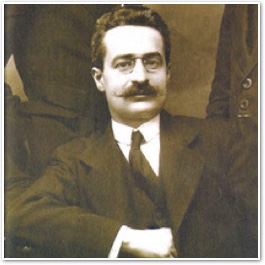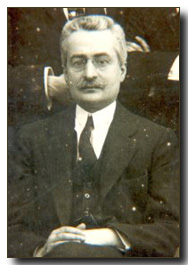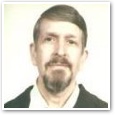Joseph Moscati: Saint, doctor, and miracle-worker
- MICHAEL J MILLER
St. Giuseppe Moscati treated thousands during his lifetime, using natural means. Now that he has gone on to his heavenly reward, he continues to have "office hours" and works amazing cures on a regular basis.
 Giuseppe Moscati
Giuseppe Moscati (1880-1927)
Giuseppe Moscati (1880-1927), a physician, medical school professor, and pioneer in the field of biochemistry, was canonized in 1987 during the synod of bishops on the laity. Not often is someone with a professional degree from a modern secular university declared a saint. Moreover, it is positively earth-shattering when an internationally acclaimed scientist becomes a certified miracle-worker.
The Holy Father hinted at the connection between sanctity and miracles in his homily at the canonization of Dr. Moscati: "Holiness is man's union with God in the power of the Paschal Mystery of Christ, in the power of the Spirit of Truth and Love . . . Love has the power to unite man with God. And this definitive love matures through the various works of charity that a man performs in the course of his life." While some Christians are suspicious of the claim that good deeds bring us closer to God, we have Christ's own word for it in the Gospel: "Come, O blessed of My Father, inherit the kingdom . . . For I was sick and you visited me" (Mt. 25:31-46).
The life of St. Giuseppe Moscati illustrates how the Catholic faith and practical charity united a layman with God to such an extent that the power of God ultimately worked in and through him.
Giuseppe Moscati was the seventh of nine children born to aristocratic Italian parents. His father's career as a magistrate (judge) led the family to settle in Naples. Every year they vacationed in the province of Avellino, his father's native region, and while there they attended Mass at the chapel of the Poor Clare nuns, with the renowned jurist serving at the altar.
The future saint inherited his father's piety and intellectual gifts. Giuseppe's unexpected decision to study medicine rather than law can be traced to an incident during his adolescence. In 1893 his older brother Alberto, a lieutenant in the artillery, fell from a horse and sustained incurable head trauma. For years Giuseppe helped care for his injured brother at home, and as he matured he reflected on the limited effectiveness of human remedies and the consoling power of religion.
When Giuseppe Moscati enrolled in medical school in 1897, the University of Naples with its openly agnostic, amoral, and anti-clerical atmosphere and its secret societies was a perilous place for a young Catholic. Moscati avoided distractions, studied diligently, continued to practice his faith, and took a doctoral degree with honors in 1903.
Dr. Moscati then practiced medicine at the Hospital for Incurables in Naples and taught courses in general medicine at the university. Soon he became a hospital administrator. He demonstrated extraordinary skill in diagnosing his patients' ailments; some colleagues attributed this to his ability to synthesize traditional methods with the findings of the new science of biochemistry.
His approach was indeed holistic, but it extended beyond what can be learned in the lecture hall or the laboratory. "Remember," he once wrote to a young doctor, one of his former students, "that you must treat not only bodies, but also souls, with counsel that appeals to their minds and hearts rather than with cold prescriptions to be sent in to the pharmacist."
A flock of interns would follow Dr. Moscati while he made his rounds at the hospital, so as to learn his techniques. While dedicating the Church of St. Giuseppe Moscati in the suburbs of Rome in 1993, Pope John Paul II described the doctor's method: "In addition to the resources of his acclaimed skill, in caring for the sick he used the warmth of his humanity and the witness of his faith."
Giuseppe Moscati regarded his medical practice as a lay apostolate, a ministry to his suffering fellowmen. Before examining a patient or engaging in research he would place himself in the presence of God. He encouraged his patients, especially those who were about to undergo surgery, to receive the sacraments.
Dr. Moscati also attended to temporal needs. He treated poor patients free of charge, and would often send someone home with an envelope containing a prescription and a 50-lire note.
On occasion he practiced heroic charity. When Mount Vesuvius erupted in April 1906, Dr. Moscati voluntarily helped to evacuate a nursing home in the endangered area, personally moving the frail and infirm patients to safety minutes before the roof of the building collapsed under the ash. He also served beyond the call of duty during the 1911 cholera epidemic and treated approximately 3,000 soldiers during World War I.
 |
"The holy physician of Naples," as he was called, also made efforts to "humanize" the medical profession as an institution. He was outspoken in his opposition to the unfair practices of nepotism and bribery that often influenced appointments at that time. He might have pursued a brilliant academic career, taken a professorial chair and devoted more time to research, but he preferred to continue working with patients and to train interns.
In another letter to a student, Dr. Moscati wrote, "Not science, but charity has transformed the world," explaining that only a few go down in history as men of science, but all can leave the world a better place by their charity.
On a Tuesday in 1927, Giuseppe Moscati went to Mass and received Holy Communion (as he did every day) and then made his rounds at the hospital. After a midday meal he felt weary, lay down, and died peacefully. He was not yet 47 years old.
Giuseppe Moscati was beatified in 1975 and declared a saint by Pope John Paul II on October 25, 1987. His feast day is November 16.
The miracle for his canonization was the inexplicable cure of a young man who was dying of leukemia. His mother dreamed of a doctor in a white coat, whom she identified when her pastor showed her a photo of Blessed Giuseppe. Through his intercession, her son was cured and returned to his job as an ironworker. The young man, Giuseppe Fusco, attended the canonization ceremony and presented to the Pope a wrought-iron face of Christ which he had made.
St. Giuseppe Moscati treated thousands during his lifetime, using natural means. Now that he has gone on to his heavenly reward, he continues to have "office hours" and works amazing cures on a regular basis. The Jesuits who staff the Church of Gesù Nuovo in Naples, where the saint is entombed, post accounts of new medical miracles at their website. In recent years, St. Giuseppe has cured a young man who ruptured his spleen in a motorcycle accident, restored to health a youngster who, during a severe asthma attack, turned blue and suffered brain damage, and even helped married couples who were having difficulty conceiving a child.
The miraculous power of the holy physician's intercession in heaven is explained by his conscientious practice of Christian charity while on earth. As he wrote to a colleague, "Only one science is unshakeable and unshaken, the one revealed by God, the science of the hereafter! In all your works, look to Heaven, to the eternity of life and of the soul, and orient yourself then much differently from the way that merely human considerations might suggest, and your activity will be inspired for the good."
 This is J. Fraser Field, Founder of CERC. I hope you appreciated this piece. We curate these articles especially for believers like you.
This is J. Fraser Field, Founder of CERC. I hope you appreciated this piece. We curate these articles especially for believers like you.
Please show your appreciation by making a $3 donation. CERC is entirely reader supported.

Acknowledgement
Michael J. Miller. "Joseph Moscati: Saint, doctor, and miracle-worker." Lay Witness (March/April 2004).
This article is reprinted with permission from Lay Witness magazine. Lay Witness is a publication of Catholic United for the Faith, Inc., an international lay apostolate founded in 1968 to support, defend, and advance the efforts of the teaching Church.
The Author
 Michael J. Miller is a free lance translator for the Catholic press. He has tranlated God or Nothing by Cardinal Robert Sarah, Pier Giorgio Frassati: A Hero for our Times by Cristina Siccardi, and Priesthood and Diaconate by Gerhard Ludwig Müller.
Michael J. Miller is a free lance translator for the Catholic press. He has tranlated God or Nothing by Cardinal Robert Sarah, Pier Giorgio Frassati: A Hero for our Times by Cristina Siccardi, and Priesthood and Diaconate by Gerhard Ludwig Müller.


